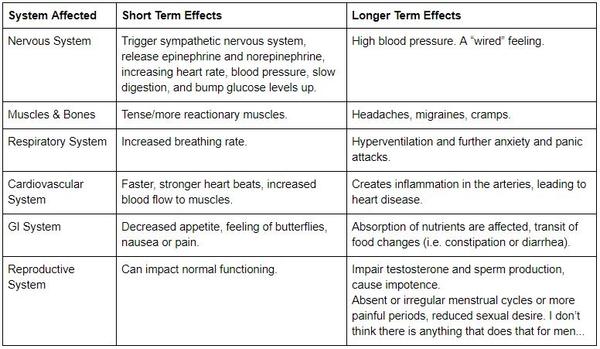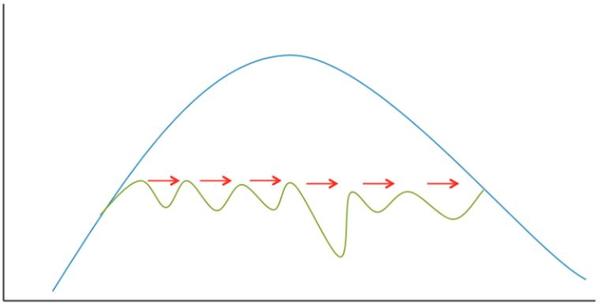To understand why we get so messed up from stress, we have to think of ourselves not as modern people, but, instead- as cave people.
The ability to get instant, super-human powers was particularly crucial back then. We’d want our blood to move quick, our muscles to get tense, energy to flow and be used quickly, and our breathing to kick up to get oxygen in there. All to escape the tigers.
It’s important to note that if we SAW a tiger, it was probably too late. So things like sounds, rustling grass, or even smells were indicators that a threat was coming. We are very sensitive to perceived threats and our body would rather be safe than sorry.
To outrun a predator, our body uses a messenger called cortisol. This gem is produced by our adrenal glands (tiny glands sitting behind and on top of our kidneys). Stress comes, adrenal glands squeeze out cortisol, and it goes to all the different systems of the body and tells them to get to work to get us the heck out of there.
This is an amazing fail-safe system to have as humans. I don’t want to get eaten. If someone is threatening me, I want to be able to act. I want to rise to the occasion, get safe, then have life back to normal as I mentally process what went down.
Stress-responses are good. Our modern problem is that our stress-response system is almost always on. Instead of large triggers, we have lives filled with perceived threats, which means our fight-or-flight system is practically always on.
These are some supplements that might help manage chronic stress.
Physically, there’s a big gap between normal function and the impact of a stress response. In the immediate, the bad outweigh the potential risks, but in cases of chronic stress, the physical impact is outright damaging.
Here’s a chart of what cortisol is supposed to do in different body systems, and what the end result of too much stress and cortisol is.

From a mental health standpoint, chronic stress can cause:
- Anxiety
- Insomnia
- Depression
- Pain
Stress is Cumulative
Like when we told everyone to redefine food, we’re going to ask that you redefine stress.
Most people think of stress as the “big things”. In fact, stress is the body’s response to any type of demand. Stress is constant in today’s life! The routine, like family, work, and daily responsibilities. The sudden and unexpected, like losing a pharmacist, a divorce, or a big financial setback. Finally, the traumatic, like accidents, deaths, wars, natural disasters.
The more stress, with the greater intensity, and the longer it lasts, the higher total stress load someone could suffer from.
Proper stress management deals with all stress sources, focusing on the most foundational stressors that we can control, then using techniques to address things out of our control.
The Three Stresses
We believe you can categorize most stress into three categories:
Emotional Stress
- Unresolved problems: “I have to call the cable company…”
- Lots of tasks to complete: “My to-do list is huge!”
- Interpersonal tensions: “That guy at work is a jerk!”
- Mental illness
Nutritional Stress
- Improper nutrition components
- Not supplying the proper nutrients in a timely manner (i.e. not eating before or after working out)
Physical Stress
- Pain, discomfort, trauma
- Exercise (or lack thereof)
- Any impact of disease, medicines, chemicals (like cigarettes!), or supplements on our bodies
Is Adrenal Fatigue Real?
Adrenal fatigue is a topic brought up by many in the natural products industry. It has no official definition nor is it an actual diagnosis. Most traditional practitioners don’t believe it is a real thing.
What is real, however, are the symptoms associated with chronic stress. Stress over a long period WILL cause all of those ugly symptoms on all of those body systems listed previously. Your adrenal gland can get overworked by always producing cortisol, and as a result, become less responsive. In our eyes, it’s always best to not use the word “adrenal fatigue”, especially when it comes to a traditional doc, because the word itself may be viewed as not a real thing.
Healthcare practitioners are one thing. Naturopathic practitioners are another. We want you to be self-care practitioners, relying first and foremost on you making the best decisions for you, resolving any and all problems via all the avenues you can control: diet, exercise, relaxation, and supplementation.
Here’s a famous Neal drawing to show what IS real:

The blue line is our natural cortisol secretion. It’s a circadian process – it rises in the morning and drops off at night. What most of us don’t know is the green line. We have tiny ultradian rhythms where the natural cortisol level fluctuates every 2-3 hours or so. Notice the big drop there? Yeah, that’s siesta time. So when you say “I get really tired between 1 and 4,” I nod and say “Yes we all do – it’s nap time!”
We can’t expect to eliminate cortisol. It’s a crucial hormone to normal body functions. What we don’t want to do is what the red line is showing on that graph. To “rise to the occasion” and deliver results expected of us, we often “push through” our body’s normal energy fluctuations. To do so requires cortisol.
Imagine some of those peaks rising higher than normal. That’s probably because your boss just told you that your results suck or a customer just screamed at you for dropping the ball.
By flattening the line out by “pushing through” or making some of the peaks as high as Everest, we are taxing our adrenal gland and the cortisol-affected tissues of the body. If we do that as much as we do, which is all damn day all damn year, we’re going to have a bad time.
The Goal of Stress Management
Our ultimate goal is to remove the red from that chart and ensure we are riding the wave better. Plain and simple. More life simple, but not easy.
Overall, we have to do what we can to get closer to our natural, daily cortisol secretion. Supplements can help during troubled times, and we’ll cover adrenal support supplements in the next article. For now, let’s talk about basic steps we can take to ensure we are minimizing chronic stress where we can.
Emotional Stress
We are excited to roll out a series on meditation and mindfulness, something near and dear to me. That will be linked in over the next few weeks. Until then, I recommend downloading the Headspace app and reading up on mindfulness and meditation. It is truly the only way to wrestle the bear that is emotional stress.
Nutritional Stress
- We have to make our campfire, meaning we have to redefine “healthy” when it comes to food, learn how to build proper meals and snacks (“campfires”), and tend to the fire throughout the day to maintain energy levels, metabolism, and blood sugar.
- Some foods can trigger inflammatory responses like omega-6 rich foods, fake butters, caffeine, and alcohol
- Dehydration is common. Staying hydrated will dramatically reduce nutritional stress
Physical Stress
- Review your medications and supplements with a qualified healthcare professional. Get rid of what you can, and actually use the stuff you keep in a consistent manner.
- Decrease alcohol and caffeine to rarities
- Stop smoking. Unless you are 80, then start smoking. All the cool kids are doing it.
- Being a doctor approved exercise regimen. Doing SOMETHING consistently is all that matters. I stretch for 5 minutes every day and do pushups, planks, situps, and lunges in my bedroom. That’s all it takes to get some activity in.
The Vital 5 For The Busy Bee
This will be fleshed out more in a future post, but someone under a lot of stress should have their bases covered and then some as it pertains to stress.
Our vital supplements for a busy lifestyle include:
Probiotics – Probiotic Complete. It’s crucial to maintain normal gut flora to help reduce gut inflammation and snuff out potential gut pathogens. While there are many lactofermented foods out there, you’re really getting a mixed bag of strains and varied dosages. It’s cheaper and easier to just use a well-made probiotic.
Fish Oil – Alaskan Omega. Stress triggers inflammation. Omega-3 fatty acids reduce inflammation in the body, yet most of us get very little EPA and DHA in our diets. Based on how much Omega-6 we eat, most of us should try to get 3000 mg of EPA and DHA into our lives daily.
Calcium/Vitamin D – This isn’t entirely necessary BECAUSE of stress, but a calcium and magnesium CAN help muscle function. Magnesium can have an overall calming effect on the body, so some people look to magnesium supplementation if stressed. Calcium Care is our whole food calcium
Protein – Many of us get enough protein, but new literature shows people over 50 are less likely to hit protein macronutrient goals. Myocep is our favorite complete protein supplement.
Multivitamin/Antioxidant – Vital Greens and Reds. In our busy lives, we rarely have time to eat healthy foods. Supplementing with a proper green and red formulation will help ensure at least a couple servings of the fruits and veggies we need. These compounds have powerful antioxidants and anti-inflammatory components that are needed during times of stress
Other Supplements a Busy Bee Might Need
A Whole Food B Vitamin – B Food. In times of stress, we churn through B vitamins quicker than anything. We don’t eat many B-rich foods anymore, like organ meats, so supplementing with a true whole food formula is a solid option.
Mental Clarity Support – Mental Alertness. People under stress feel like they can’t focus. We have a unique herb combination that helps support mental clarity.
Food on the Go – Complete Nutritional Shake. A busy bee ain’t got time for cooking! Using a properly made replacement shake can mean the difference between cold, frostbitten toes and a campfire that keeps cooking.
What Doesn’t Kill You Makes You Stronger
There are so many cliches out there, and I feel that this one is probably one of the dumbest there is. But I will admit, the sentiment is right on the money. Whatever stressors you are plagued with, the satisfaction you will get from resolving them (by solving a problem or simply removing stressors), is great. With it comes wisdom and the ability to lead a smarter life where stressors like that are completely avoided in the future. We hope.
To really get around stress and rise above it, we have to redefine stress and what’s supposed to be normal. Too often do I hear people not being honest about what really is a stressor or resigning to the fact that a high level of stress is normal or OK.
We have to be self-care practitioners. This title makes caring for ourselves a job – the most important job! Start with what you can control. What you eat and what you put into your body. Your perception about the stressors. Exercise and stretch to get some of that excess energy burned off in a healthy way, instead of stuck in the mental trap of stress management.
Most importantly, make time to relax. Ride the natural wave of cortisol. Every couple hours, look at cat pictures on the internet. At 1 pm, take a nap. Unless you work a forklift or drive a truck, then wait till you stop. This article was released just before on July 4th, when most of us get a day off. I hope you enjoy it, and then commit to a stronger self-care focus on July 5th.
Just trying to keep it real…

Neal Smoller, PharmD
Owner, Pharmacist, Big Mouth



